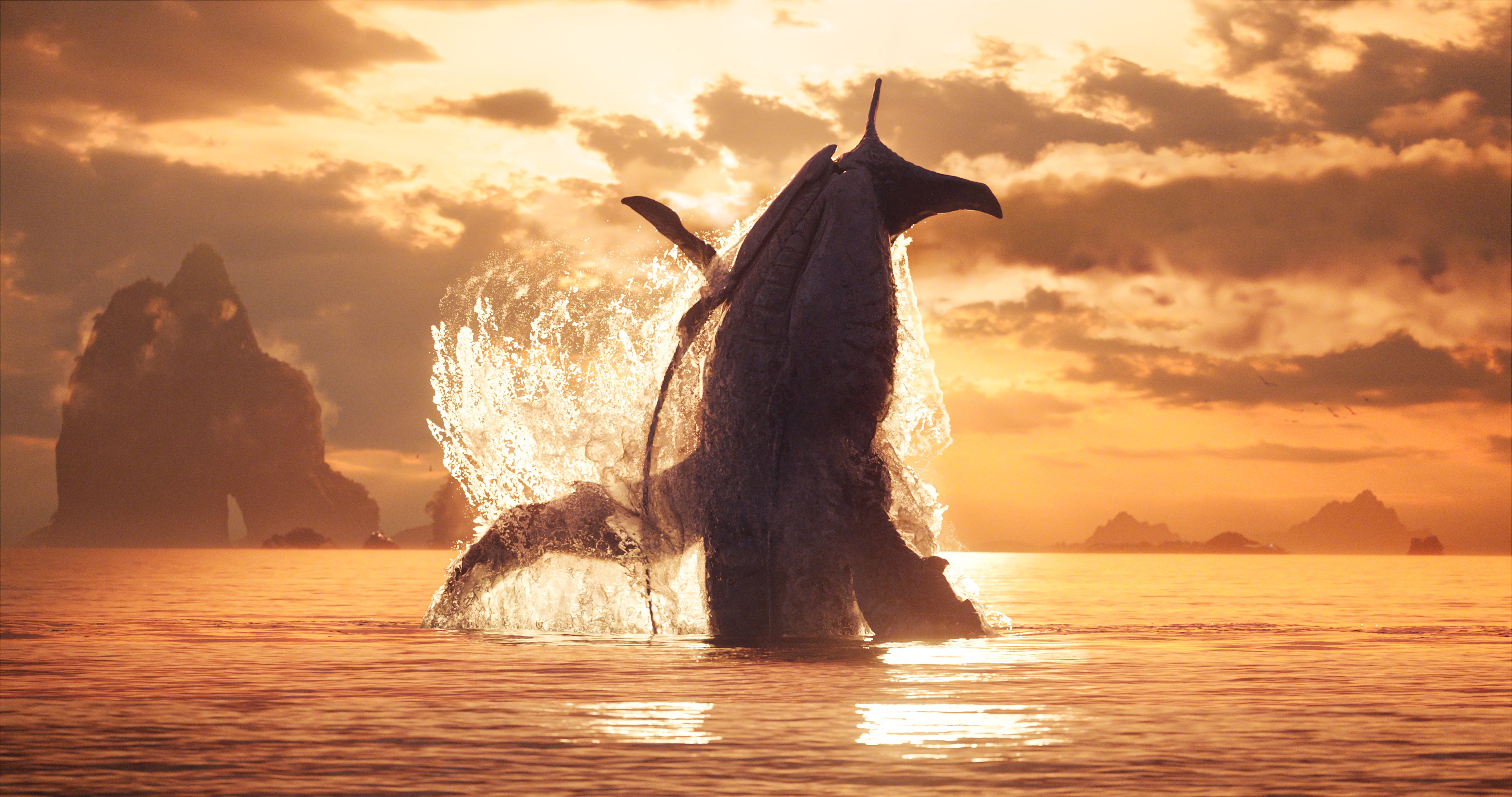Warning: Below is a spoiler-filled discussion about Avatar: The Way Of Water
The Way Of Water is upon us. 13 years after the game-changing, record-setting first movie, James Cameron’s hotly discussed sequel (with another three on the way) is here. A rousing good vs evil epic rooted in love and connection, 2009’s Avatar remains one of my favourite blockbusters. The greatest triumph of Cameron's smash hit was that, for me, the visual spectacle came secondary to feeling, characters and grandiose storytelling. So much so that I still consider lines like “you have to see it in IMAX to enjoy it!” almost insulting. As if to say the film is empty visual delight alone and that it only really has something to offer when experienced on the largest screen possible. I’d argue that it’s an incredibly well-crafted story however you choose to see it.
The first film also remains one of the most affecting, emotionally-charged origin stories in recent memory (yes, including most superhero movies you’re thinking of). The transformational journey of jarhead Jake Sully, an unlikely leader driven by love who’s forced to rise to the occasion, is one for the ages. But if Avatar is one of the greatest on-screen origin stories, The Way Of Water is a story about exploring our origins. Specifically parenthood and our relationship with where, and who, we come from and how our lineage defines us. With their sequel, James Cameron and co-writers Rick Jaffa and Amanda Silver pivot to the personal. Grand world-building comes second to a more intimate portrait of family. If anything, despite the convention of most sequels going ‘bigger’, The Way Of Water tells an oddly smaller, more contained story than its predecessor.
Its been years since the events of the first film where Jake rose up to become Toruk Makto and lead the Omaticaya people to victory against their human invaders to drive them off Pandora. Jake and his people have since created a peaceful utopia, coexisting with their human scientist allies who chose to stay behind, led by Norm. Jake and Neytiri have also since built a family together - teenage sons Nateyam and Lo’ak, young daughter Tuk and adopted daughter Kiri (not their biological daughter, but instead a child mysteriously born of Grace’s Avatar body). “Happiness is simple” Jake’s soothing voiceover tells us, adding “but the thing about happiness is that it can vanish in a heartbeat”. Of course, the Sky People have returned, and in greater numbers.

But for the Sky People it’s no longer about exploiting Pandora’s rich resources, but about taking it over. Planet Earth is dying, we’re told, and the humans are here to make Pandora their new home, for which they must first eradicate the Na’vi, with an Avatar-clone of a desperate-for-revenge Colonel Quaritch once again leading the hunt for Jake. (So, is death, then, just a light suggestion in this world? If they kill this new Quaritch, are there 50 others like him ready to go?). To keep his family safe, a scared Jake is forced to take refuge with the reef people of the Metkayina clan.
Despite what we might have expected, this second movie doesn't serve as a start of the inevitable clash between the People and the human race, but rather delays it. The war for Pandora gets temporarily put on hold to examine the battle raging within. Jake must contend with the demands of being a leader as against those of being a parent. It’s a decision that leaves the film, at times, feeling like a giant set-up for a larger payoff down the road.
Aside from the sheer delight of returning to this world and these characters, what first struck me about The Way Of Water is how it examines the idea of identity and what it means to belong. In the first movie, aside from Jake, to be a member of the human race or the Na’vi people were two fairly well-defined boxes. But here those lines have now blurred entirely.
![]()
Jake Sully is a human adopted by the Na’vi who’s come to learn their ways as a warrior and leader. Yet he remains an outsider. Despite being born on Pandora, his children too, are outsiders and are never allowed to forget it. For one, they all have four fingers, denoting that their physiology stems from their father’s Avatar body. Similarly, Norm and the other human scientist allies now live on Pandora among the People, some with their own Avatar bodies. Most intriguing of all is Spider - a young human child who was left behind when the humans were driven away in the last film. Spider has grown up on Pandora alongside Jake’s children. Na’vi in spirit but human in appearance. A child born of two worlds, but belonging to none. Not to mention his biological father, Colonel Quaritch, and his new roster of bad-guy-marines who now exist in Avatar bodies. Human in spirit, Na’vi in appearance. (Aren’t their human overlords scared that by breeding more Avatar marines, they could well have another Jake-Sully-rogue -marine situation on their hands?)
But at its core, The Way Of Water is an examination of parenthood. Those that define us, those that we never got to know, and those we wish weren’t ours. “A father protects..it's what gives him meaning” Jake says. But so lost is he in being a protector that being a father gets sidelined. His stern, uncompromising approach to raising his kids gives us a flicker of an indication of what Jake’s own father must have been like and the level of discipline he must have inflicted on Jake.
For Neytiri (the beating heart of the first film, whom we don’t get enough of in this one), it’s less about her own parents but the price she’s made to pay to become one. For her love of Jake and the family they’ve built, the list of sacrifices she’s had to make is painful and unending - forced to give up her home, her identity, her father, and now even her people to move away from the forest and embrace the sea. What more must she forsake? Angela Bassett's heart-wrenching “Have I not given enough?” speech from Wakanda Forever couldn’t help but reverberate in my head.
For Spider it’s about coming to terms with his lineage. Colonel Quaritch, the man responsible for the destruction of everything Spider has grown to hold dear, who he believed was dead, is now back. Despite refusing to join him, Spider can’t help but save his father’s life. Even as the enemy, the bond of a father is not so easily broken. It’s a decision that will no doubt have grave consequences in the next movie or movies (though I maintain that Quaritch isn’t a compelling enough “villain” to hold three or more films together). For young Kiri, it’s not about knowing the truth about her (biological) father, but rather the pain of not knowing. All Kiri understands is that her mother, Grace, died, and the identity of her father remains a mystery (though it seems fairly obvious that it was in fact a virgin birth and Kiri is born of Eywa as some sort of physical manifestation of her spirit, who will have a significant role to play in the ultimate fate of Pandora).
But nowhere is the fable of fathers and sons more potent than between Jake and Lo’ak. Constantly compared to his perfectly responsible older brother Nateyam (who remains the only character we barely get to know), Lo’ak is forever seen as a disappointment. So lost in being a leader is Jake, that he doesn’t see that Lo’ak is more like him than he realises. Driven by heart before mind. Do first, think later.
At its most rich, family and parenthood take precedence over spectacle - as seen in the most potent stretch of the narrative (in both visuals and emotion) where the Sullys are adapting to a life at sea. At times, I felt like I was watching This Is Us but with big blue people. As Jake learns to live on the water, Lo’ak finds belonging with an outcast Tulkun, and Kiri starts to understand her connection with Eywa, we get a stunning stretch of filmmaking where every iota of awe is blended with feeling and visual splendor; every frame beaming with wonder and love. We feel like we’re exploring the beauty of Pandora through a child’s eyes. Conversely, at its shakiest (particularly in the climax showdown which feels too similar to the first movie) the film does fall to the curse of the sequel- repetitive, bloated, and uneven with the familiar elements rehashed.
With the movie’s final moments it becomes clear that this film is essentially the origin story of Jake and Neytiri’s children and the start of the no doubt defining role they’ll come to play in shaping and saving Pandora. The Way Of Water sets the stage for a grand family saga within a sprawling action epic about the People fighting to protect their home. The battle within is over. Jake Sully understands that there’s no running from this enemy. The only way out…is through. It’s time to take a stand. Time to fight. The war for Pandora is about to begin.





